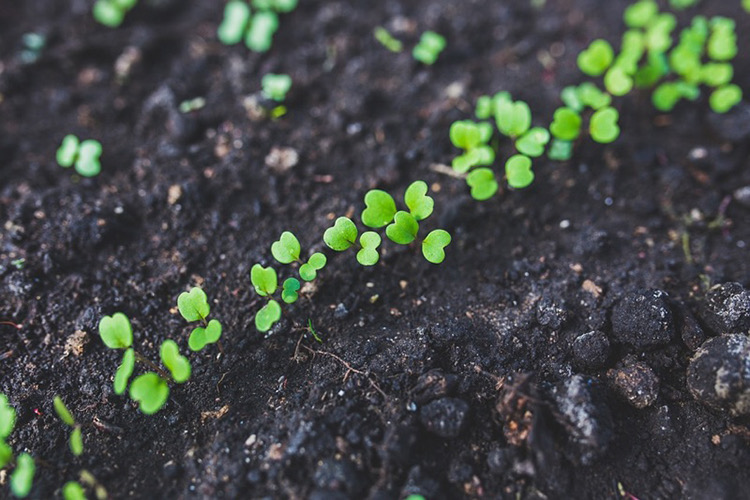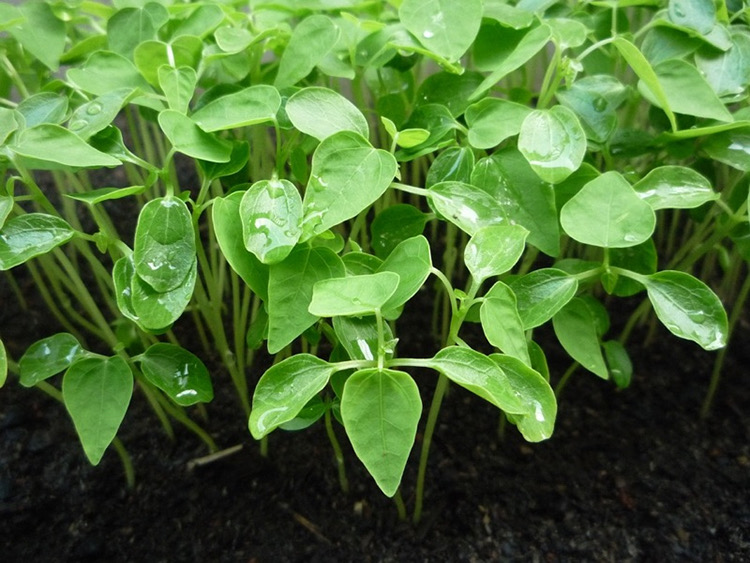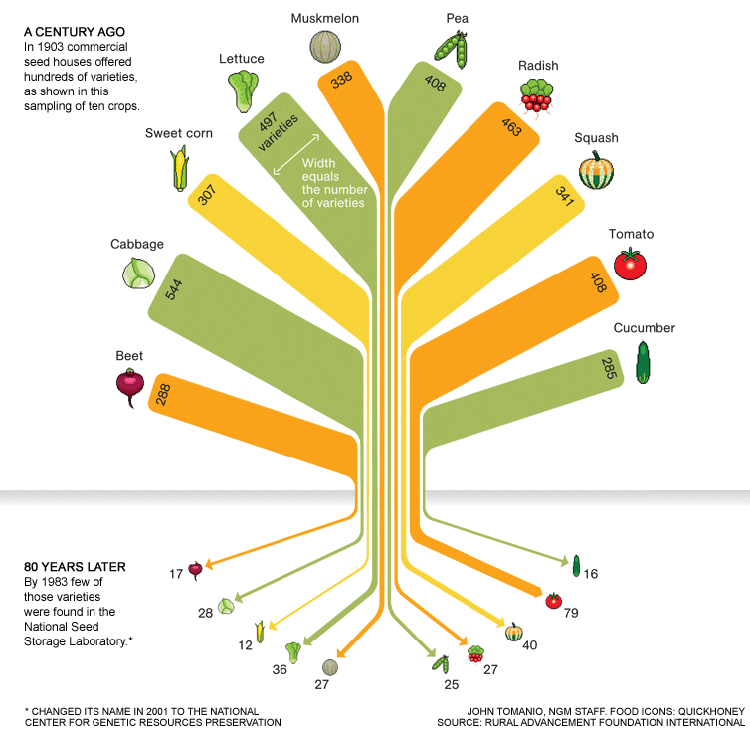Breaking news from The Guardian last month, FDA (Food and Drug Administration) internal emails show that US government scientist have detected weed-killer linked to cancer in commonly consumed foods. When I say common I mean honey, crackers, granola, cornmeal, oatmeal, baby food, and corn. The FDA just this year began testing American food for traces of glyphosate. Glyphosate is a chemical that has been used for over 40 years in food production. Glyphosate is the main ingredient in Monsanto’s popular Roundup brand, which was labeled as a carcinogen by the International Agency for Research on Cancer (IARC) in 2015. This article will discuss the problems with Glyphosate and the benefits of organic seeds.
So, maybe you just read that and now you’re freaking out a little bit. I did. I mean, I don’t think anyone really wants to eat food that can cause cancer. So, how can we avoid eating foods with glyphosate in them? It’s a good bet that plants exposed to Roundup will have glyphosate in them and so will their seeds. I can argue that the corn we eat is technically a seed and they’ve found the glyphosate in corn. But, there is no research currently looking at seeds. Now that we all are aware of this terrible news, what can we do about it?
Well, good news, there are a few different ways farmers grow seeds. There’s organic, conventional, and now, thanks to good ol’ technology, genetically modified organisms (GMOs). We’re going to cover all three.

What is GMO Seeds?
First, we know GMO seeds are not available to the public for gardening. However, understanding what GMO’s are is still important in understanding how we currently produce food. So, let’s identify what we mean by GMO. It’s true, throughout history, humans have selectively grown and bred plants. I’m sure, in high school, you were taught the fundamentals of genetics. Gregor Mendel, the “Father of Modern Genetics,” crossbred pea plants with different characteristics. The difference between selectively growing the plants of the past and current GMO production is simple. GMO plants cannot, ever, be produced using natural methods.
How do we make GMO’s?
GMO plants are created by inserting genes, sometimes from other species, into the genetic DNA of a plant. They are developed in a lab, at the cellular level. According to the Genetic Literacy Project, the Big Six (Bayer, BASF, Dow, DuPont, Monsanto, and Syngenta), use the term “innate” to reference genetically modified varieties. These varieties that do not contain genetic material from other species, but use other genetic modifiers to produce the seed. Again, these seeds are still only and can ever only be produced in a lab [1]. By the way, together, these companies account for a little more than half the sales of seeds, pesticides, and fertilizers around the world [2].
What is Conventional Seeds?
Conventional seeds are available pretty much everywhere. The seeds you find in your grocery store or hardware store, are conventional seeds unless labeled organic. Conventional really means ‘unspecified.’ Unspecified means the seed producers do not have to disclose what chemicals, process or growing methods were used to produce the seed [3]. These seeds are sold by large corporations, usually the Big Six. Conventional seed production is one of the most chemically intensive types of agriculture. This is because the seed crops themselves are not meant for human consumption. Therefore, pesticide regulations are less strict for these crops allowing for higher doses of harmful chemicals, like the lovely aforementioned Roundup (You caught the sarcasm right?) [4].
What is Organic Seeds?
Now let’s look at what we mean by organic. Organic seed is seed that is produced by organic gardening/farming methods and processes as defined by the USDA’s National Organic program (for the USA) or other organic certifiers. This process prohibits the use of synthetic fertilizer and pesticides, as well as genetically engineered seeds and materials [5]. Basically, organic seeds means the seeds are grown and produced much more naturally than conventional or GMO seeds. This includes the “old school” ways of crossbreeding plants to produce organic seeds with desired traits, just like our Father of Modern Genetics.

So, why should we care again?
Well, here are 3 big reasons why we should care if we grow seeds or eat produce made from organic seeds as opposed to GMO or conventional seeds.
Reason 1
First, and this is the BIG ONE, organic seed farmers cannot to use synthetic herbicides or fertilizer when growing their seeds. This means, organic seeds will NOT have glyphosate in them. Also, as long as organic food is grown with organic seeds, no glyphosate can be in those foods either. Conventional seed on the other hand can be blasted with as much herbicide as the seed farmer wants/needs. Unlike their organic counterparts, conventional seeds are dripping in synthetic pesticides and herbicides (like glyphosate). And what is worse, evidence from independent, FDA-registered food testing laboratories have found high levels of herbicide glyphosate in human urine, breast milk and blood [8]. Cool, I’m sure glyphosate is a great thing for me to give to my infant. Score one for organic! So, by buying organic seeds and growing them or buying organic food, you can avoid getting cancer or giving your children cancer just from eating food. You’re welcome.
Reason 2
Second, GMO’s are not a good choice, organic is better by far and here’s why. The FDA does NOT test whether GMOs are safe nor does the FDA require independent pre-market testing for GMOs. This means, literally, that the Big Six submit their own studies as proof of GMOs safety. They don’t even have to submit the full and complete information about these studies either [7]. The issue here is that there are no checks to make sure that the information they are providing is accurate. Anyone remember those cigarette ads claiming tobacco is good for your health? Literally, no testing is required for the safety of genetically modified or engineered seeds and plants. The result, the American people have become one big science experiment.
Reason 3
Third, is seed diversity. Now this isn’t something that you would necessarily relate to conventional, GMO or organic seed arguments. However it is related and it’s one of the main reasons we created SeedWise as an organic and non-gmo seed marketplace. Seed diversity is critical to our ability to provide enough food for the planet because individual varietals that are monocropped (meaning the same plant is grown in large quantities over many acres) and overly popular can get easily wiped out by disease and climate change. In addition, GMO seeds are the intellectual property of the companies that sell them, requiring farmers to purchase new seed every year rather than plant the seeds the plants naturally produce [10]. The National Geographic put out this infographic by John Tomanio, providing a stark visual for the loss of seed variety. Between 1903 and 1983, the United States alone lost 83% of the unique seed strands from the most popular produce.

A little more about the FDA and Glyphosate
So, just to make you a little bit more angry, the United States Government Accountability Office (GOA) wrote a report in 2014. The report states from 1970 to 2007, hundreds of millions of pounds of pesticides were applied to U.S. food crops. First paragraph of that report is worth a read. FDA emails show that one of their lab’s found glyphosate in numerous samples of honey and oatmeal products. After which, the FDA temporarily suspended testing and reassigned the lab to other programs. The US Department of Agriculture, set to start its own testing of foods for glyphosate residue in 2017, dropped the plan. The FDA has a “legal limit” for glyphosate in food. Cool. Thank you federal government for letting lobbyists make it OK for me to ingest herbicide. One of the corn samples the FDA was testing found glyphosate significantly over the legal limit set by the EPA. The emails show that the chemists asked what to do. The FDA responded by saying that corn was not an “official sample” and will be ignored.
If you’re not convinced about our arguments, we invite you to check out our sources, dig deeper, and inform yourself. If you ARE convinced, we invite you to review the seeds for sale on our marketplace! Check out the farmers here at SeedWise who lovingly and carefully grow organic seeds and non-gmo seeds. We’ve got a wonderfully diverse selection from across the United States and Canada. Make the right choice to protect your health and the health of your family. Buy organic seeds and non-gmo seeds from SeedWise. Know your farmer, know your seed.
